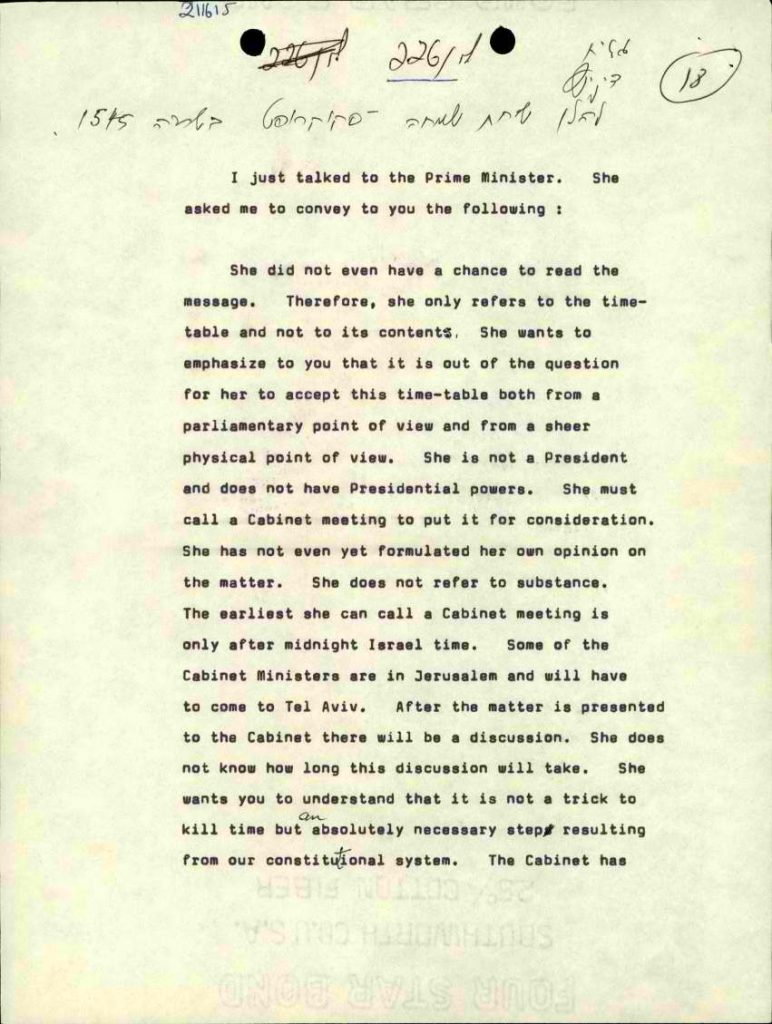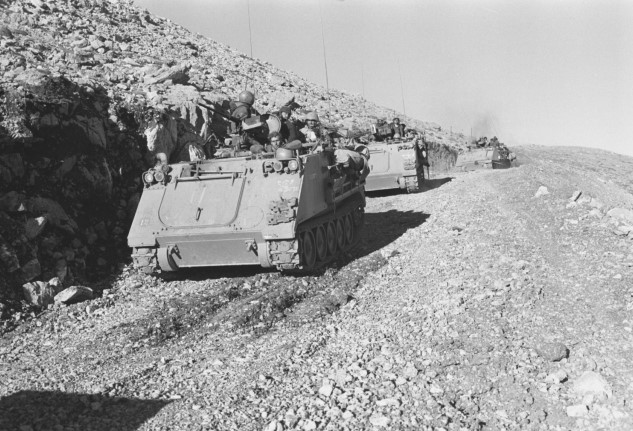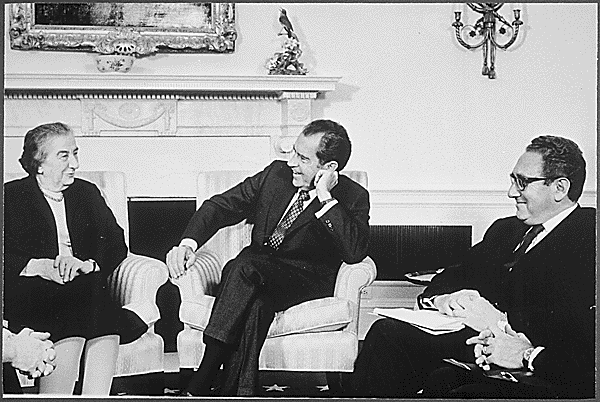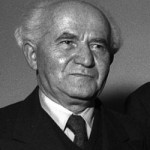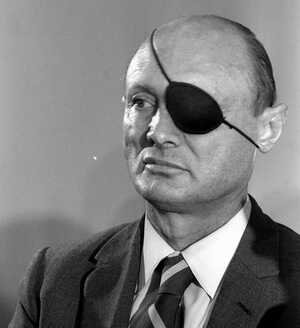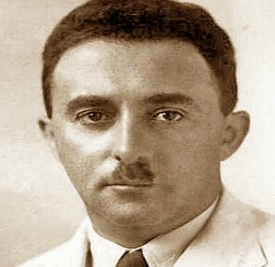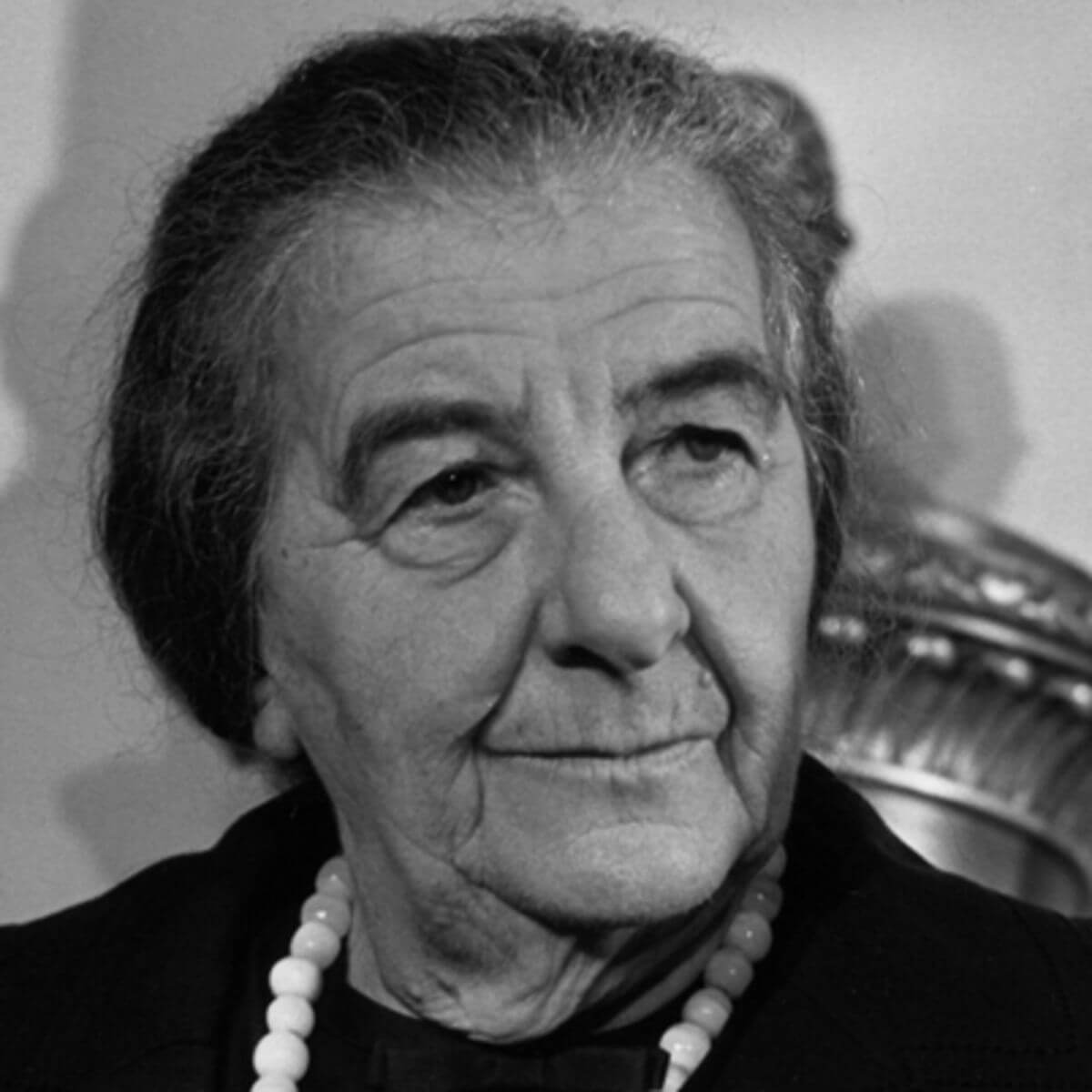.1 | 20 October 1973: The Beginning of the Final Stage – "A Great Victory, Not Only For Israel and America, But For All Lovers of World Freedom"
The fifteenth day of fighting, Saturday, 20 October, marked the last stage of the Yom Kippur War, and its main focus was the IDF’s attempts to improve its positions before the ceasefire resolution, and its continued improving of positions, even after it was passed.
In the morning, Dayan told Golda that he wanted to capture Port Fuad at the northern tip of the Suez Canal. However, these plans were threatened by a severe lack of ammunition. The supply in the emergency stores was almost finished. Although the Americans had approved all Israel’s requests for ammunition, the problem of transporting it was unsolved. On average, 20 flights from the US arrived every day, but these could not fulfill immediate needs, and the supply of ammunition by sea would take time. Without a massive supply of ammunition, the COGS warned, the IDF might be unable to continue to fight. In telegrams Dinitz was instructed to put pressure on the Americans to add 20 urgent flights that very day, carrying ammunition, tanks and mainly 155 mm artillery – which was about to run out completely, and preferably to send it from the US army warehouses in Europe in order to save time (See: Telegram No. VL/970).
Golda decided to intervene and to call Dinitz: “Our friend [Kissinger] has given us a task to carry out, and it can’t be done by praying. If it’s possible to obtain tanks from Germany, then it’s also possible to get artillery shells. It’s a difference of hours. 16 hours is an eternity. Call him now [5 a.m. in Washington]; tell Scowcroft that I really apologise to him, but he must understand that it’s extremely serious”. The Americans promised to send Israel 20,000 artillery shells in the next two days.
An additional matter on the agenda was fuel stocks. This became urgent when Saudi Arabia announced that same day, as did other Arab countries, a cutback in the supply of oil to the US – with fears that the sanctions would increase. At 13:00 Golda met with Zvi Dinstein, the deputy minister of finance, and received reports on Israel’s stocks of various types of fuel. Although the situation was satisfactory, Dinstein supported the proposal to take over the Morgan offshore oil field in the Gulf of Suez, which was under joint Egyptian-American ownership, as well as the “Tapline” oil pipeline on the Golan Heights which carried oil from Saudi Arabia through Jordan, Syria and the Heights to Lebanon. The takeover was intended to prepare Israel for the impending oil crisis, to release it from the problematic dependence on oil from Iran, and perhaps even as a bargaining chip in future negotiations. Golda was not inclined to agree, and said that in any event, American approval must be obtained. Gazit wrote to Dinitz: “Taking over the Morgan oil field opens up a chance of assuring ourselves of a continuous source of oil supplies” (See: Telegram No. VL/975).
Meanwhile, the encouraging reports on the southern front continued. At 18:05 Dayan reported to Golda that if all went well, “then on Monday evening we can hope to be in positions from Suez to Ismailia”. Later Dayan said that there were reports that the Egyptians had 400 Scud missiles, and hinted that it would be better to avoid attacks on civilians, so as not to give Sadat an excuse to launch them. After having supported capturing Port Fuad, Dayan now pulled back, arguing that it might encourage Sadat to ask the Soviets to launch missiles at civilian Israeli targets. “Why on earth did the Russians give him 400 Scud missiles? We know he had only ten. The Russians may incite him”, said Dayan.
At 19:30 Golda and Allon met with Eban, who had arrived from New York. Eban said that Kissinger was very encouraged by the Israeli successes, and was awaiting the completion of the military operations in order to move forward diplomatically. They exchanged impressions on events in the Jewish world and the immense change the war had created in Israel. Eban told of Jewish doctors in the diaspora who were requesting to come to Israel, and Golda told him of the sons of well-known people who had fallen and of the change that had occurred in the public: “This people is completely different, and you wouldn’t recognize it”, she said to Eban. “Those same doctors who were on strike, and El Al workers who are doing everything humanly possible” (For the full minutes of the consultation, see: Cabinet Document No. 22).
The government was to meet at 21:00, but a consultation was held earlier by the prime minister and her staff with Eban, Allon and Galili on the question whether to capture Port Fuad. No decision was reached (For the full minutes of the consultation, see: Cabinet Document No. 23). Before the government meeting, the COGS reported to Golda on the military situation. Dayan summed up the Israeli casualties, which reached 1,019 dead and 4,988 injured, and the loss of equipment, which included 99 airplanes and no less than 1,180 tanks. “If it weren’t for the US, I don’t know where we would be”, he said. He repeated that the best line to hold at the end of the war would be the Canal line, and it would be best if the IDF were on both sides.
“I believe that there are people in the American administration that would do everything they can in order to end the war, simply so that they could sleep at night”, Golda said at the government meeting, and added: “One man in the White House [Scowcroft] was woken at night at 3:00 a.m., and again at 5:00 a.m., in order to deal with the issue of transporting the ammunition.” The American aid arrived due to the friendship between the two nations, but mainly because Israel had proved that it had the strength to recover from the blows it had absorbed: “If, heaven forbid, we had gone downhill, this investment in arms and equipment that we are receiving would not have come. It came because we were given the credit that if we were given help, we could use it”.
Previously, Tsur had given the government a detailed report on the military supplies from the US: Israel’s requests, items that had already arrived, and those expected. With regard to planes, the response to Israel’s requests was satisfactory; however, the shortage of ammunition was due to transport problems, arising – among other things – from the embargo declared by European countries on the transit of arms shipments. In addition, Israel feared possible action by Egyptian submarines against ships carrying military supplies. Dinitz was asked to examine the possibility that the Sixth Fleet would guard the supply ships, as the Soviets were doing (See: Telegram No. VL/980).
The chief of staff then reported on the southern front. Dayan too complained of supply difficulties, especially in light of the massive aid that was streaming in to the Arab countries. As for the Scuds, he said: “What the USSR is giving them is enough to destroy Tel Aviv”. Dayan said that it was likely that a second Jordanian brigade would enter the fighting, but the signs pointed to it also being sent to the Syrian front, and not attacking Israel from Jordan. Considering the conditions in which the war started, the indications were that it would end in a great victory.
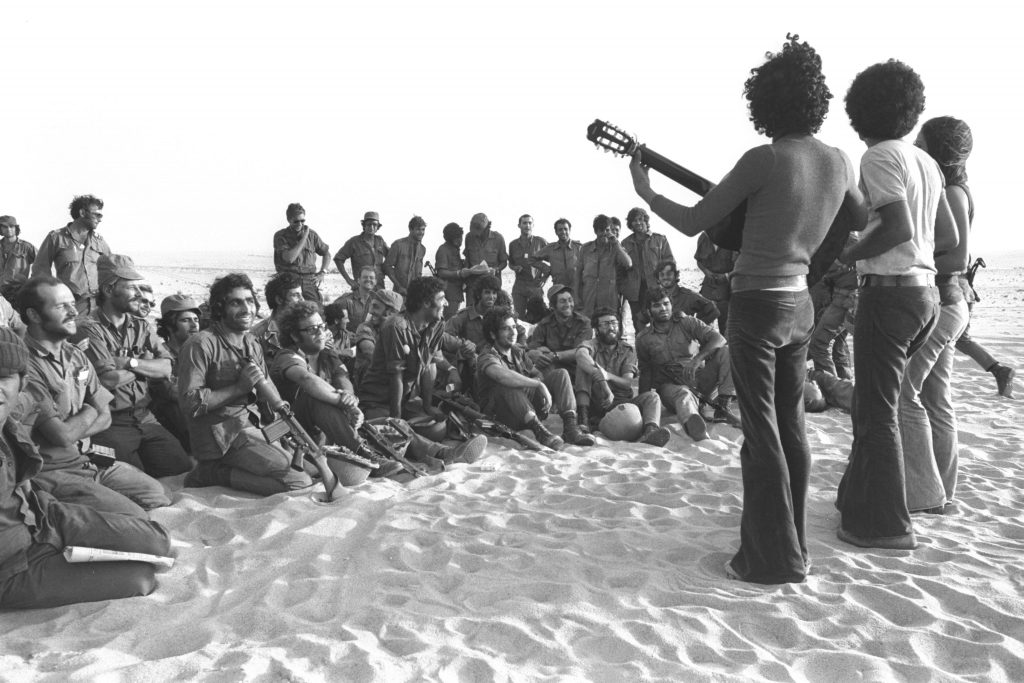
Volunteer artists performing for soldiers in Sinai, 20 October 1973. Photograph: Ron Ilan, GPO
The rest of the meeting dealt with the Americans and Kissinger’s trip to Moscow. Golda and Eban praised Kissinger, but the prime minister declared that she had no illusions about th US motives. Ultimately, the Americans and the Soviets were acting according to their own interests, some of which were mutual. She did not ‘buy’ the story that Kissinger had received an urgent invitation to Moscow, and she thought that the trip had been coordinated in advance with the Soviets: “We have the impression that he didn’t go there urgently. He took a large entourage with him, and it’s impossible to say that he hurried to pack an El Al flight bag and flew to Moscow, because Moscow told him to come immediately”. However, an agreement would not be easy to reach, and she expressed the hope “that they won’t surprise us… and we will learn about it from the radio”. She thought that it would take another two or three days before they would have to deal with a ceasefire resolution, and the government decided to establish an inter-ministerial committee to prepare Israel’s conditions for negotiations on a ceasefire (For the full minutes of the meeting, see: Government Document No. 18).
These impressions were reinforced by the telegrams from Dinitz. Kissinger asked Dinitz to tell Golda on the eve of his departure that he had no clear instructions and would have to play the talks “by ear”. In the existing military situation, he felt that he was in a position of strength, since “you have made that possible for me. You have brought about a situation in which America and Israel emerge victorious from this war that was forced on us by the Arabs and the Russians. This is a great victory, not just for Israel and America, but for all lovers of world freedom” (See: Telegram No.LV/194). This was the first time since the war began that the secretary had linked Israel and the US together in this way – as full partners and allies. Before he left, Israel equipped Kissinger with a detailed report on the situation (See: Telegram No. VL/974), and it was agreed that Israel would continue to update him on an ongoing basis. The first report Dinitz received on the talks in Moscow, which he passed on that night, apparently reinforced Golda’s assumptions. (See: Telegram No. LV/212 below; summary by Gazit on the time factor in Kissinger’s talks in Moscow, 16-22 October 1973, File A 7023/1).
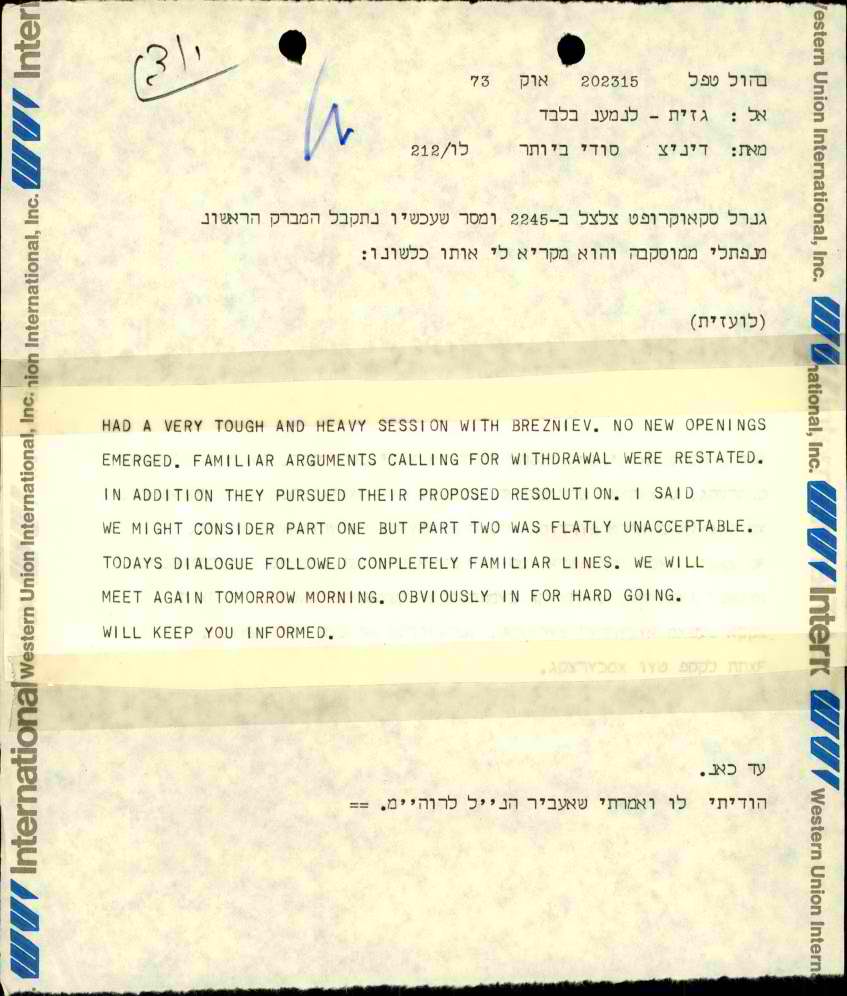
Dinitz passes on Scowcroft’s report, 20 October 1973. File A 4996/5, p. 371
The long day ended with a consultation with Zamir at 23:45. Zamir reported his view that Sadat would not agree at this stage to a ceasefire, and a long war of attrition might develop on the existing lines – a scenario very unwelcome to Israel. Reports that Sadat would not agree to a ceasefire under any circumstances were also received from other sources. Zamir added that great amounts of arms continued to reach Egypt, but he thought that the Egyptians would not fire Scud missiles unless they felt threatened. He claimed that the Arabs’ perception of the war was that it had returned their honour to them, because this time they were not defeated (For the full minutes of the day, see: the Prime Minister’s Bureau Journal – 20.10.73).

